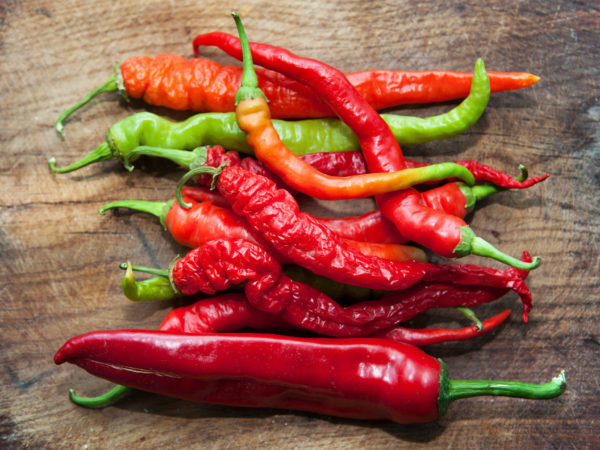Spicy Diet for High Triglycerides?
I heard on the radio that eating spicy foods can help lower triglycerides. Is this true? If so, what kind of spices should I use, and I’m curious about how spices would do this.
Andrew Weil, M.D. | May 10, 2012

Triglycerides are the chemical forms in which fat moves through the bloodstream. They are mostly derived directly from fats in your diet, but some are also made in the body from carbohydrates. When the calories you consume are not used immediately, they are converted to triglycerides, transported through the bloodstream, and stored in fat cells. Hormones then regulate their release to meet energy needs. Whenever your LDL (“bad”) cholesterol is measured, triglycerides are also checked. Levels lower than 150 milligrams per deciliter (mg/dL) are considered normal, and levels above 200 mg/dL are considered too high.
Some research has suggested that eating spicy foods can lower triglyceride levels by about one-third. This finding comes from a small study at Penn State that compared the effects of eating a 1,200 calorie, high-fat, high-carbohydrate meal of chicken curry, Italian herb bread, and a cinnamon biscuit spiced with a two-tablespoon blend of turmeric, garlic, oregano, paprika, rosemary, cinnamon, black pepper and cloves to the effects of eating the same meal without the spices. The study leader said that the spices used provided antioxidants equivalent to amounts found in five ounces of red wine or 1.4 ounces of dark chocolate. The study participants were healthy, overweight men between the ages of 30 and 65. They ate the spicy meal at one sitting and then, a week later dined on the same food without the added spices.
The researchers commented that they decided to examine the effects of these particular spices on triglyceride levels because lab tests have shown that they have potent antioxidant properties. The researchers measured the participants’ triglyceride levels before each meal and every half-hour after eating for three-and-a-half hours. They reported that after the spicy meal, the men’s triglycerides dropped by about one-third, compared to their levels when they ate the same menu minus the spices a week later. In addition to the drop in triglycerides seen, the researchers reported a 13 percent increase in antioxidant activity in the blood and a 20 percent decrease in insulin response.
What we don’t know yet is whether eating spicy foods regularly will result in lower triglyceride levels in the long term. The research team now plans to study which spices in the blend were most beneficial and how much of them would be needed to reliably produce effects similar to those seen in this pilot study.
Until we know more, I wouldn’t count on spicy foods to keep your triglycerides in check. However, we do know that garlic, turmeric and ginger have antioxidant and anti-inflammatory properties, and I have long recommended including them in the diet. Rosemary has been shown to increase blood flow to the brain, improving concentration. It also contains numerous anti-inflammatory compounds, and has been used medicinally for centuries.
Serum triglycerides can soar after you load up on carbs, especially the high-glycemic-load kinds that quickly raise blood sugar. Reducing intake of these carbs, along with regular exercise, and weight management can help keep triglycerides under control. I would also suggest cutting back on alcohol, avoiding beer especially. (Even small amounts of it can elevate triglyceride levels.) In addition, increasing your intake of omega-3 fatty acids can substantially reduce triglyceride levels. Start by eating salmon, sardines, black cod, and herring on a regular basis. You should also consider taking a good fish oil supplement, at least two grams per day, which can help lower your triglycerides into the healthy range. Fasting triglycerides should be less 150 and, optimally, less than 100.
Andrew Weil, M.D.










